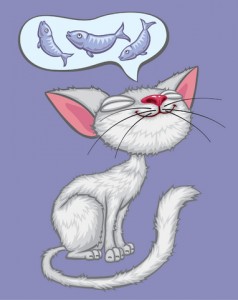Distinguishing Appetite From Hunger

‘Tis the season for re-evaluating our weight and nutrition goals, no? The gyms are packed, the diet center ads are running constantly, and around this time, people generally resolve to “lose weight” and/or “get healthy,” once and for all . . . .
There are lots of obstacles to losing weight and eating healthily – you probably know what they are for you. But have you thought about why you eat in the first place? We generally have two reasons for eating: hunger and appetite. The two are completely different, and keying into which is motivating you at any given moment may help you push away from the table or avoid foods that might sabotage your healthful eating efforts.
What is Hunger?
Hunger is the ‘need for food’. Your body lets you know you’re running low on fuel and that food’s needed to give your body the energy it needs to perform an activity. Hunger instinctively protects the body from depleting energy reserves.
What is Appetite?
Appetite, on the other hand, is described as the desire, or craving for food. It might be prompted by the sight or smell of food. Passing a bakery and smelling fresh baked goods is an example. Your stomach may be full because you’ve just eaten, but the smell and sight of the bread and desserts stimulates your appetite.
Habits and moods affect our appetite, too. Many of us eat out of habit (i.e. noon=lunchtime regardless of whether you’re actually hungry), or in response to various moods like sadness, anger, anxiety or boredom. Habits and emotional stimuli can be very powerful cues to eat, and very often, to overeat.
How to Tell Them Apart?
Knowing the difference between hunger and appetite is half the battle when it comes to weight loss. Tune in to your body before you start eating and ask yourself whether you’re truly hungry, or whether there’s something else going on.
For some people, an effective way to get at this is to keep a journal for a week or two. For every time you eat, write down (1) what you ate, and (2) the circumstances of your eating – meaning, what caused you to eat, how you felt when you ate. I’ve never incorporated emotions/circumstances into my food diary, but I know that it can be enormously powerful for some people – if you have any interest in doing this, I’d go for it. It can’t hurt and it could provide some valuable insight.
I have to confess, I only started thinking of the distinction between my hunger and my appetite recently. I know that in the past I ate when I was sad or depressed, and now I know that boredom is a trigger for me to munch, but I had never really thought about the technical definitions of hunger and appetite. Since I have been, I realize that my appetite is also stimulated by reading and writing about food – which I of course do for a few hours every day. I now realize that I have a huge appetite, but my actual hunger level is often fairly low. If I take a minute and wait before heading to the fridge or cabinet, I can often derail eating based on merely appetite, and not hunger.
This is all best boiled down to Emma Fogt’s “food rule,” submitted to Michael Pollan when he solicited readers’ tips for eating healthfully. It bears repeating to yourself when you’re going for that handful of Cheez-its: “If you’re not hungry enough to eat an apple, then you are not hungry.”
© 2010, Sarah. All rights reserved.
-
Sara
-
http://goodtastehealthyme.wordpress.com Ash @ Good Taste. Healthy Me
-
http://thekitchwitch.blogspot.com TheKitchenWitch
-
http://www.pink-apron.com Kelly










